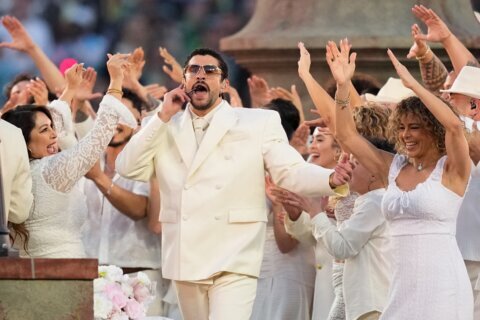Harper Lee’s novel “To Kill a Mockingbird” rocked the world in 1960, as did the Gregory Peck movie adaptation in 1962.
Now, Aaron Sorkin’s Broadway adaptation of “To Kill a Mockingbird” visits the Kennedy Center in D.C. now through Aug. 27, starring Richard Thomas as Atticus Finch and Yaegel T. Welch as Tom Robinson.
“It’s a coming-of-age story that packs a punch,” Welch told WTOP. “It’s a very impactful story because it still connects to us today. Our brilliant playwright, Aaron Sorkin, has decided to take this expansive novel, which covers so many zany, quirky characters — the story of Tom Robinson is only two chapters in the book — but he centers our particular tale around the trial of Tom Robinson and how it affects a Southern white family.”
Set in the small town of Maycomb, Alabama, in the early 1930s, the timeless coming-of-age story follows Scout Finch and her older brother Jem as they grow up during the Great Depression. They fear their reclusive neighbor Boo Radley as some kind of boogeyman, then watch their lawyer father, Atticus Finch, defend an innocent Black man, Tom Robinson, against false charges of raping a white woman in the Jim Crow era of the Deep South.
“It’s really the story of how racism and prejudice affects a small white Southern family,” Welch said. “Atticus is a single father raising two kids and he’s defending a Black man who’s been falsely accused of rape, a crime that he could not have possibly committed due to exculpatory evidence. … However, in the process of this trial … the young girl, Scout, and her father, Atticus, the lawyer, really get to investigate the world of empathy.”
The story still remains timely to our current era of the Black Lives Matter movement.
“It connects a current, modern-day American audience to it right away,” Welch said. “We’ve been through so much as a culture recently due to the pandemic and due to videos on cell phones where we’ve actually been able to witness the injustice happening where we can’t deny it.
“We’re automatically connected because we see things like George Floyd, Breonna Taylor, Eric Garner, Trayvon Martin, we can go as far back as Emmett Till. … All a white woman had to say was that a Black man touched her, looked at her, whatever, and that Black man was dead.”
He praises cell phones as a game changer compared to the era when lynchings were swept under the rug.
“The truth is right now, if it weren’t for cell phones, there would still be a lot of convictions without evidence,” Welch said. “Derek Chauvin may have gotten off if there wasn’t people standing by taking out their phone to record what was happening and watch him murder George Floyd. ‘To Kill a Mockingbird’ tackled that back in the early ’60s … but it’s still happening today, the only difference is we have a defense mechanism: a phone.”
You can almost imagine the 2017 white nationalist rally in Charlottesville, Virginia, during a scene outside the Maycomb jail where Atticus and his kids stand up to a KKK mob trying to kill Tom Robinson before trial.
Scout disarms one of the rioters with the simple words, “Hey, Mr. Cunningham,” making him ashamed to be there, like several Jan. 6 insurrections expressing regret after waving Confederate flags as they stormed the U.S. Capitol in 2021.
“The ultimate goal is that we’re going to ‘Hey, Mr. Cunningham’ all injustice,” Welch said. “The accountability may not come from a little girl, the accountability should probably come from the law. … What I want to see is the law hold people accountable to what we agreed to do as a society. There are plenty of Mr. Cunninghams that are the sheriffs, plenty of Mr. Cunninghams that are the judges, plenty of Mr. Cunninghams that are our senators.”
The hope is that audiences will walk out inspired to continue the march for progress.
“‘To Kill a Mockingbird’ stands the test of time,” Welch said. “It’s a very American story if you’re Black, white, whatever. … Individuals who watch the film, read the book or come see our play, we all leave connected to it, because we know it to be true. … It’s such an American tale that we’re all so connected to that it will be a timeless classic for us until racism is eradicated. If something like that ever happens, this story will always be relevant.”
Listen to our full conversation here.







